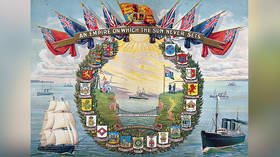Other countries honour their dead without issue, but British TV presenters can't wear a poppy without someone getting ‘offended’
The little red flower pinned to a lapel is a simple and understated way of remembering the fallen, and we should not allow it to be turned into something controversial by petulant attention seekers.
There’s a quiet dignity about wearing a poppy.
For those unaware, it’s a traditionally British way of remembering those who have died fighting wars. They are usually sold by volunteers and veterans in public places, in exchange for a few coins. TV presenters clip one onto the lapel of their jackets, some brands adapt their logos to include it, all in the lead-up to Remembrance Day on November 11.
It’s nothing flashy, edgy or political, just a simple and earnest tribute to those who are no longer here.
But it would appear nothing is sacred in Britain any longer, even the humble poppy has been dragged into the mire. There's a growing clamour to have it designated as a form of political statement. Those in support feel it’s unfair that political badges or membership of organisations like BLM are not viewed the same as the poppy and this week, a storm ensued on social media, whipped up by anti-Brexit commentator Femi Oluwole.
He challenged the BBC over their recent ban on staff displaying support for political causes – he tweeted: “Why are your presenters wearing poppies? Your rules ban ‘virtue signalling’ no matter how worthy the cause.”
There was no shortage of replies, as the debate dominated Twitter. A sample of opinions were:
“You tell Femi to keep his mouth shut, I am pissed off with these BLM trying to rid us of our culture.”
“Pathetic. Wear my poppy with pride, it’s respect. A friend of ours had his legs blown off in Iraq, it’s nothing political.”
“The poppy is often misused by some as a badge of British patriotism, of course it’s political. Many old soldiers refused to wear them as they felt it glorified war.”
The eye of this unsightly storm is where some people seem desperate to place the poppy. They want to project an image that suits their narrative, almost to rewrite history, or at the very least politicise that which never was.
Whether you wear one or not, there is no political link. Prime Ministers and government officials from all parties wear it. The fallen soldiers being remembered come from England, Wales, Scotland and Ireland – and many other countries. There were many black troops who lost their lives fighting for Britain. There were also regiments from the Indian subcontinent, perhaps most famously the Gurkhas.
People are free to honour them all, but there is no mandatory requirement for the poppy to be worn.
It’s supposed to be a classy nod of appreciation, to those who fought for us, not a political red rag to a bull. The range of reactions only proves how cancerous discourse in Britain is becoming. Individuals are feigning offence at a silent tribute, because they have been hoodwinked into a distorted belief that equality means you shouldn't praise one group over another, regardless of context.
Oluwole even continued the discussion live on national TV. It was a sorry state of affairs to watch bile and anger being spewed at the noblest of causes, and, possibly worse, it showcases how what it means to be British troubles some people.
To be a patriot now, is synonymous with being a racist in most circles. Some cringe when a Union Jack is unfurled, as a sign of empire and colonial atrocities.
There’s no doubt Britain has a poor legacy of appropriating foreign lands to blunder their resources.
And it probably is unresolved in terms of our education system, and general awareness. But the poppy isn’t a celebration of empire, it's a way to show a basic level of compassion and respect to those who gave their lives so we could be free.
Britain is alone in this bitter scenario of trying to politicise the honouring of war heroes. America clears the decks and has two official federal holidays in honour of the military, Memorial Day in May and Veterans Day in November. Considering they only have 10 federal holidays a year, that is quite the honour, and on top of that they even celebrate Armed Forces Day on the Saturday of Memorial Day Weekend.
Russia celebrates Victory Day on May 9 when people wear the Ribbon of Saint George, flowers are laid at graves, and all the fallen in WWII are remembered. Next to the Kremlin, the Tomb of the Unknown Soldier features an eternal flame. It is both elegant and a source of kinship. Italians become one on National Unity and Armed Forces Day, Norway has its Veterans Day and Germany has observed a People's Day of Mourning since 1952.
All of these nations don’t have to undergo the poisonous conversations Britain does about its war dead. They are able to recognise some things are beyond points-scoring. It’s a stain on Britain that this petulant refusal to let the souls of the fallen lie in peace exists. It is part of a mentality that only wants to highlight differences and ignore connections.
The poppy is a small, unremarkable piece of paper, plastic or metal, but what it signifies is how millions of lives were lost or changed forever, the majority through no choice of their own, for our shared future as a nation.
To hijack that is unforgivable.
Think your friends would be interested? Share this story!
The statements, views and opinions expressed in this column are solely those of the author and do not necessarily represent those of RT.

















